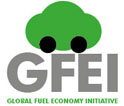
Road pricing
Road pricing is an economic concept regarding the various direct charges applied for the use of roads. Congestion pricing or congestion charges - a type of road pricing aimed at addressing environmental costs - is a system of surcharging users of a transport network in periods of peak demand to reduce traffic congestion. Market economics theory, which encompasses the congestion pricing concept, postulates that users will be forced to pay for the negative externalities they create, making them conscious of the costs they impose upon each other when consuming during the peak demand, and more aware of their impact on the environment.
So far, practical examples of congestion charging on urban roads are limited to a small number of cities, including London, Stockholm, Singapore, and Milan. Four general types of systems are in use; a cordon area around a city center, with charges for passing the cordon line; area wide congestion pricing, which charges for being inside an area; a city center toll ring, with toll collection surrounding the city; and corridor or single facility congestion pricing, where access to a lane or a facility is priced.
United Kingdom
In central London, low-emission vehicles – in particular HEVs - are exempt from the £8 daily London congestion charge. Due to their low levels of regulated emissions, the greenest cars are eligible for 100% discount under the current system. To be eligible the car must be on the current Power Shift Register. At present, these include the cleanest LPG and natural gas cars and most hybrid-, battery- and fuel cell-electric vehicles.
Italy
The Ecopass program is a traffic pollution charge implemented in Milan, Italy, as an urban toll for some motorists traveling within a designated traffic restricted zone or ZTL (Italian: Zone a Traffico Limitato), corresponding to the central Cerchia dei Bastioni area and encircling around 8.2 km2. The Ecopass was implemented as a one-year trial program on January 2, 2008, and later extended until December 31, 2009. A public consultation was planned to be conducted early in 2009 to decide if the charge becomes permanent. The primary purpose of program is to reduce traffic and air pollution, it is based on a fee structure according to the vehicle's engine emission standards and to use the funds raised through the charge to finance public transportation projects, cycle paths and green vehicles. This program is similar to the congestion pricing programs implemented in London and Stockholm, but actually corresponds to a variation of these pricing schemes as only vehicles with high-polluting engines entering the ZTL are charged, and the ones with older most polluting engines are banned.
Sweden
The Stockholm congestion tax, also found referred to as the Stockholm congestion charge, is a congestion pricing system implemented as a tax which is levied on most vehicles entering and exiting central Stockholm, Sweden. The congestion tax was implemented on a permanent basis on August 1, 2007, after a seven-month trial period between January 3, 2006 and July 31, 2006. The primary purpose of the congestion tax is to reduce traffic congestion and improve the environmental situation in central Stockholm. The funds collected will be used for new road constructions in and around Stockholm. A referendum was held in September 2006 a couple months after the end of the trial period. In the referendum the residents of Stockholm municipality voted yes and in 14 other municipalities voted no to implement it permanently. On October 1, 2006, the leaders of the winning parties in the 2006 general election, declared they would implement the Stockholm congestion tax permanently. The parliament approved this on June 20, 2007, and the congestion tax came into effect on August 1, 2007. The amount of tax payable depends on what time of the day a motorist enters or exits the congestion tax area. There is no charge on Saturdays, Sundays, public holidays or the day before public holidays, nor during nights (18:30 – 06:29), nor during the month of July. The maximum amount of tax per vehicle per day is 60 SEK (6.34 EUR, 9.85 USD).







